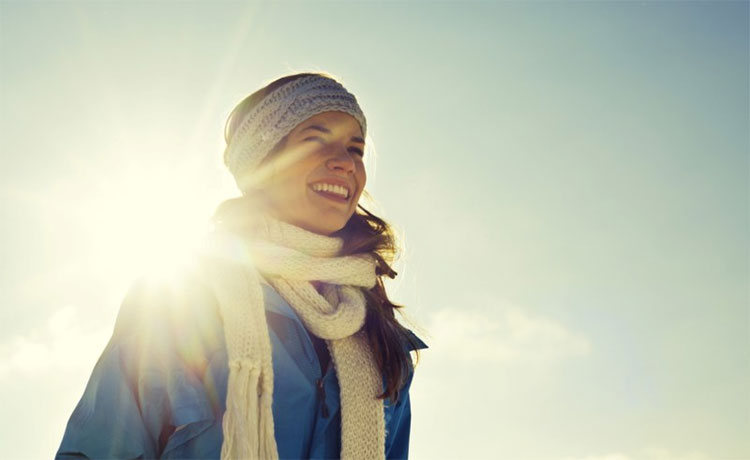Do we get sunburn in winter?
The answer is yes. The amount of ultraviolet (UV) radiation decreases slightly in the winter but is still at risk, especially for people with sensitive skin.
"Sun rays can be harmful to the skin even when it is cold and cloudy. Therefore, any area of the body exposed to the sun can still be sunburned , " according to progress. Dr. Apple Bodemer, dermatologist at the University of Wisconsin-Madison (USA).

99% of ultraviolet rays reach the ground in the form of UVA.
When it's cold, our skin is often covered "from head to toe" in coats, hats, gloves, masks. Along with that, the amount of radiation emitted from the sun decreased slightly in the winter. But the risk of winter sunburn for people who have direct exposure to the sun is always present, especially those with sensitive skin.
Dr. Bodemer says that even if you wear a full body, your face is still in direct contact with ultraviolet radiation. When UV rays penetrate deep into skin cells, they can cause DNA damage.
The sun emits three types of ultraviolet rays: UVA, UVB and UVC , in which UVC is blocked by the ozone layer in the atmosphere, 99% of the ultraviolet rays reach the ground in the form of UVA.
Because it is easy to penetrate the ozone layer to protect the Earth, UVA rays can cause premature aging, bruises and wrinkles if exposed to the sun for a long time. Meanwhile UVB rays (which can pass through the ozone layer, though also partially filtered), can cause skin redness, blackening, sunburn and increased risk of skin cancer.
According to Dr. Bodemer, skin damage from ultraviolet exposure increases over time and can eventually lead to skin cancer. This is the most common type of cancer in the United States with about 3.3 million people suffer each year, according to the American Cancer Society.
In addition, in areas with snow and frost, the skin suffers more from the sun. According to the organization Skin Cancer Foundation, snow and ice reflect up to 80% of the UV rays from the sun. That means you are being attacked from both sides: first from the sky and second from the ground.

UVA rays can cause premature aging, bruises and wrinkles if exposed to sunlight for long periods of time.(Illustration)
To reduce the risk of sunburn, you can use sunscreen, preferably with a sun protection factor (SPF) of 30 or more.
As a general rule, SPF 30 will block about 97% of UVB rays, SPF 50 will block about 98% of UVB rays and SPF 100 will block 99% of UVB rays, according to Dr. Steven Wang, from Memorial Sloan Kettering Cancer Center ( New Jersey - USA).
Experts also suggest using broad spectrum sunscreen to protect skin against both UVB and UVA rays.
This way, you do not need to "hibernate" in the house for fear of skin damage.
- Types of sunburn you may encounter in hot weather
- Dermatologists recommend the 3 fastest ways to remove sunburns
- Is ice good for sunburned skin?
- What really happened when we were sunburned?
- Hanoi winter moments
- Winter this year comes early, colder than the last 5 years
- The disease is common in the winter
- Please admire the poetic beauty of Hanoi winter
- France gives birth to a smart bikini
- Risk of skin cancer from summer day game 'sunburn tattoo'
- What do animals do to overcome icy winter?
- 8 tips to help you wake up easier in the winter
 'Fine laughs' - Scary and painful torture in ancient times
'Fine laughs' - Scary and painful torture in ancient times The sequence of numbers 142857 of the Egyptian pyramids is known as the strangest number in the world - Why?
The sequence of numbers 142857 of the Egyptian pyramids is known as the strangest number in the world - Why? Miracle behind the world's largest stone Buddha statue
Miracle behind the world's largest stone Buddha statue What is alum?
What is alum?